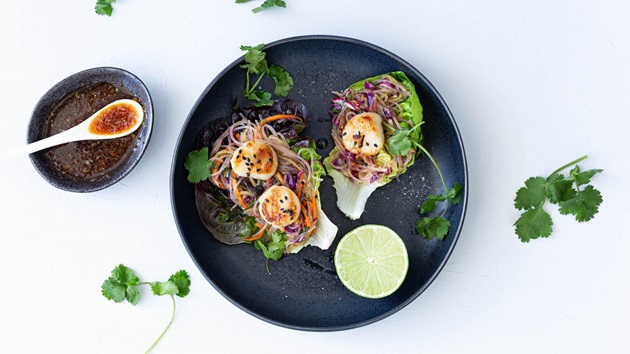Bass Strait scallops are caught out of the Commonwealth managed fishery, the largest scallop fishery by area in the Bass Strait.
“By having the MSC blue fish tick, the Bass Strait Scallop Industry Association demonstrates that their harvesting of the resource supports good fisheries management practices, which helps to ensure fish-stocks and habitats are healthy, and fishing community livelihoods are secure well into the future,” said Renee Pearce, Executive Officer of the Bass Strait Scallop Industry Association.
The ever popular Bass Strait scallop, with the majority of catch landed in Lakes Entrance, Victoria have a distinctive vibrant orange roe and is a classic on Australian menus.
“Scallops are a staple on dinner plates, especially in the southern states, some arguing it’s not a real scallop unless it has the orange roe!” said Ms. Pearce, “and you can’t go past a seaside bakery without stopping in for a scallop pie, it’s a tradition we are lucky to have. They are tasty and sustainable.”
[i] The Commonwealth Government managed scallop fishery operates in the Bass Strait above Tasmania and extends from the Victoria/New South Wales border, around southern Australia to the Victoria/South Australia border. The fishery lies between the Victorian and Tasmanian scallop fisheries.
Bass Strait Scallop Industry Association
- Represents the Bass Strait Central Zone Scallop Fishery
- The purpose of the association is “to represent and to progress the interests of the Bass Strait Scallop Industry”
- The BSCZSF is managed by the Australian Fisheries Management Authority (AFMA)
Marine Stewardship Council
- The Marine Stewardship Council (MSC) is an international non-profit organisation which sets globally recognised, science-based standards for sustainable fishing and the seafood supply chain.
- The MSC ecolabel and certification program recognises and rewards sustainable fishing practices and is helping to create a more sustainable seafood market.
- More than 530 fisheries worldwide are currently certified to the Standard, representing 16% of wild marine catch, making it the largest sustainable fishing program in the world.
- 23 Australian fisheries are now certified to the MSC Standard for 32 fish species, accounting for 47% of Australia’s wild marine catch.
- The influence of the MSC Fisheries Standard extends far beyond certification, with its requirements used globally as a framework for those seeking to improve ocean sustainability. It is the only wild-capture fisheries certification and ecolabelling program that meets best practice requirements set by both the United Nations Food and Agriculture Organization (UNFAO) and ISEAL, the global membership association for sustainability standards.


